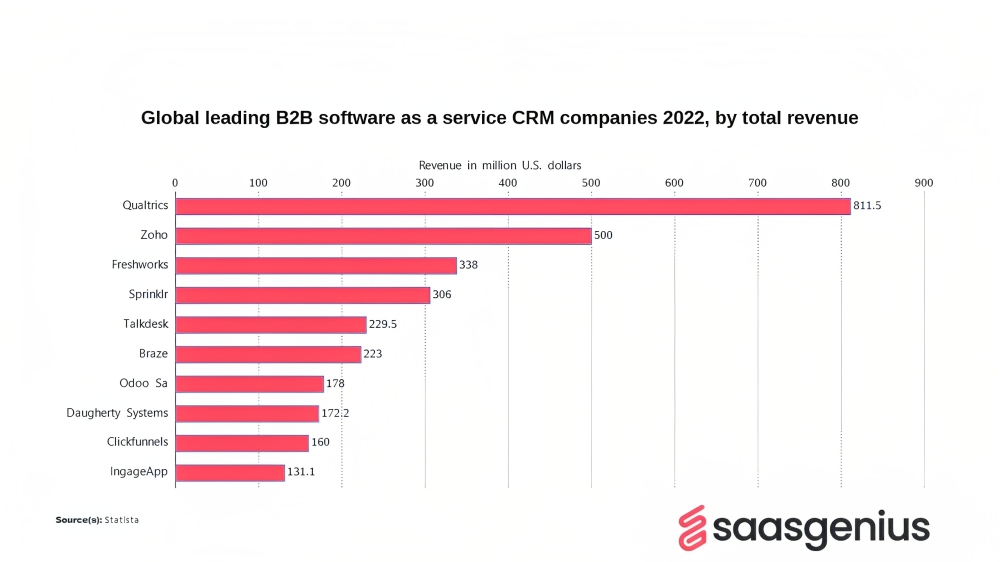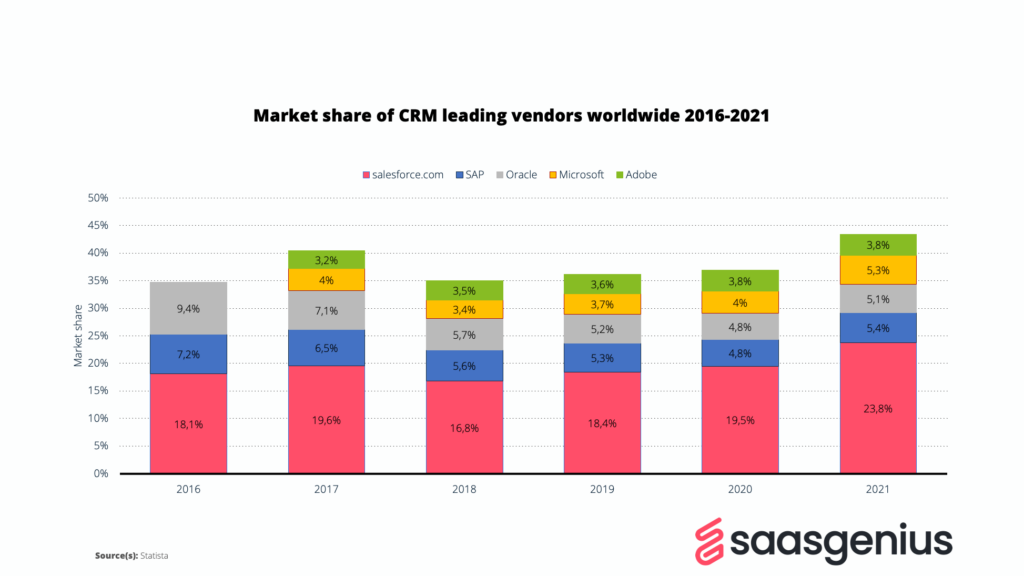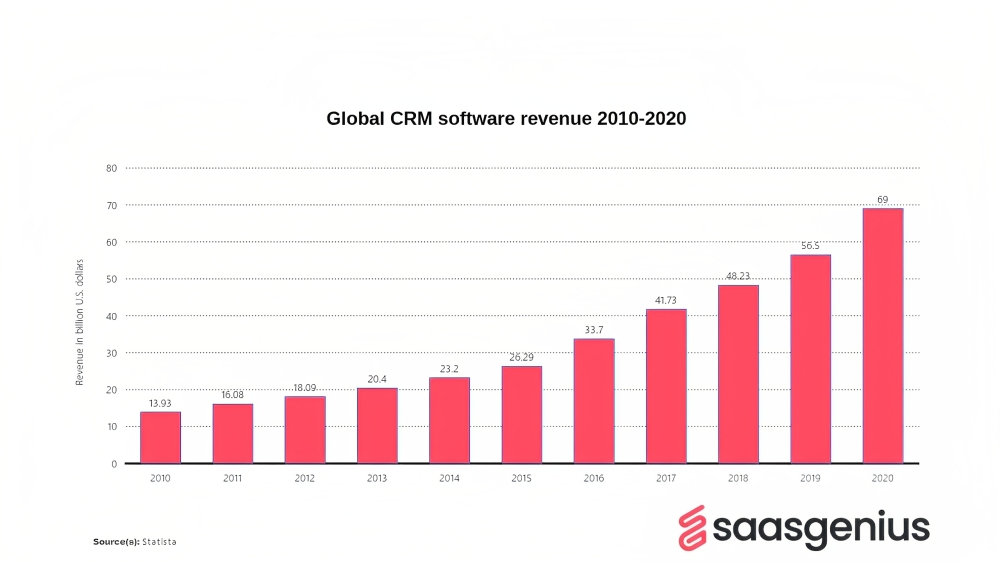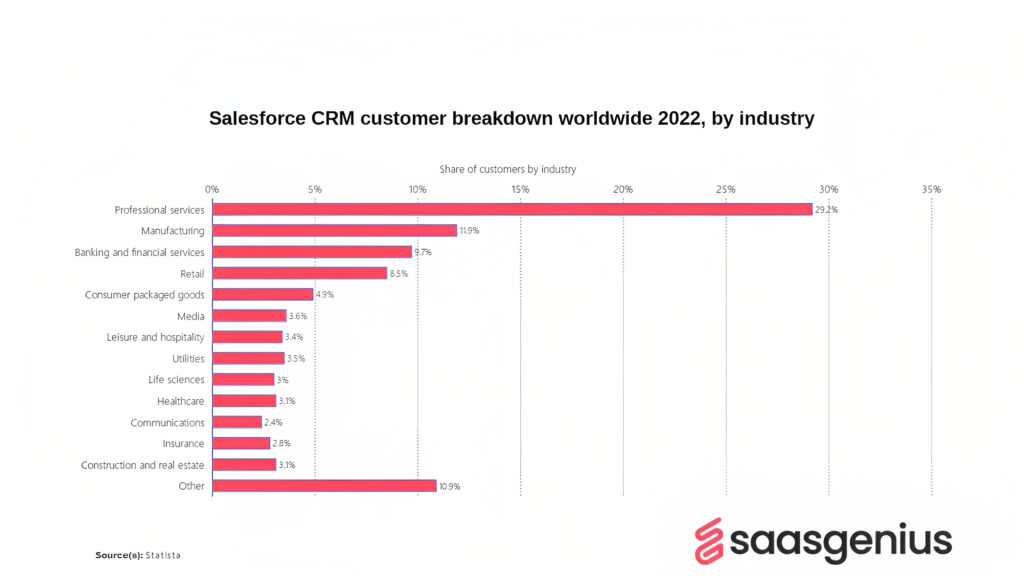Introduction
In today’s world of business, we have tools for everything. One of the goals as an entrepreneur is to find that sweet spot between automating your efforts and not overpaying on subscriptions. SaaS companies offer solutions for virtually every element of running a business, and managing your customers is no different.
Customer relationship management (CRM) tools allow you to manage interactions with your (current and future) clientele, provide high-quality customer support, and improve lead generation and conversion.
As time goes by, CRM software is increasingly becoming a staple in any business. As a result, we have hundreds of CRM solutions to choose from. The best ones include all of the necessary features (and then some), and it’s up to your preferences to make a choice.
CRM companies rake in billions of dollars every year.
In 2022, the top 10 CRM software (in terms of revenue) were:
- Qualtrics
- Zoho CRM
- Freshworks
- Sprinklr
- Talkdesk
- Braze
- Odoo Sa
- Daugherty Systems
- Clickfunnels
- IngageApp

Biggest CRM Companies — What the Stats Say
Despite not featuring on the list above, Salesforce is still the most recognizable and most-used CRM solution out there. The PaaS company provides more than CRM — it’s a cloud platform that also supports creating marketing campaigns, managing sales operations, e-commerce automation, and so on.
As always, success is never observed idly, with many companies trying to compete with Salesforce, including some of the big dogs, such as Microsoft, Adobe, and Oracle. Nonetheless, Salesforce managed to remain in control of the largest portion of the market share, increasing its stake over time.

It’s interesting to note that all the biggest CRM brands and CRM providers come from the United States. In fact, the concept of running a SaaS company has yet to fully develop in other countries. In 2022, the U.S. was home to about 17,000 SaaS companies. Comparably, countries that follow the United States are as follows:
- Canada: 2,000
- United Kingdom: 2,000
- Germany: 1,000
- France: 1,000
- India: 994
- China: 702
- Brazil: 647
- Australia: 631
- Spain: 511
Quick Tip
Are you looking for a CRM solution to increase your lead generation and conversion rates? With so many solutions on offer, it’s hard to make a choice, especially if you don’t have any experience with CRM software. Check our list of the best CRM software, and learn about each tool, including Salesforce CRM, Zendesk Sell, and HubSpot CRM.
Interesting CRM Facts
The global CRM software market has been on a consistent rise. In the past decade (2010–2020), the CRM market grew from under $14 billion to $69 billion in yearly revenue. As shown in the graph below, the rise is steady, and it’s hard to state that the pandemic has had an impact, with companies switching to online communication.

Another interesting aspect of the use of CRM is its breakdown by industry. If we focus only on Salesforce CRM, almost 30% of its revenue comes from companies in the professional services industry (i.e., companies that focus on providing a service rather than manufacturing a product).
Interestingly, businesses from the healthcare industry combine for 3.1% of Salesforce CRM customers, surpassing industries such as insurance and communications.

Summary
CRM solutions can help any business build up its customer base. They help you to automate processes and optimize your efforts. With a CRM tool at your disposal, you can turn a potential contact into a returning customer.
As we’ve seen above, the CRM market is on the rise and doesn’t plan to stop. All businesses can benefit from using CRM software, regardless of the industry they’re in. Thanks to this, top CRM companies are able to bring in millions of dollars each year.
With so many different solutions to choose from, it’s hard to make a decision about which tool would be the best fit for you. Luckily, we’ve got you covered with our in-depth reviews of CRM and sales solutions.
Related Articles
Frequently Asked Questions (FAQ)
- Salesforce
- HubSpot Sales
- Zoho CRM
- ClickUp
- Monday.com
- Pipedrive
Author
Methodology
- Who?
We are SaaS experts: Our specialists constantly seek the most relevant information to help support your SaaS business. - Why?
We are passionate about users accessing fair SaaS pricing: We offer up-to-date pricing data, reviews, new tools, blogs and research to help you make informed SaaS pricing decisions. - How?
With accurate information: Our website manager tests each software to add a Genius Score using our rating methodology to each product. Our editorial team fact-check every piece of content we publish, and we use first-hand testing, value metrics and leading market data.
